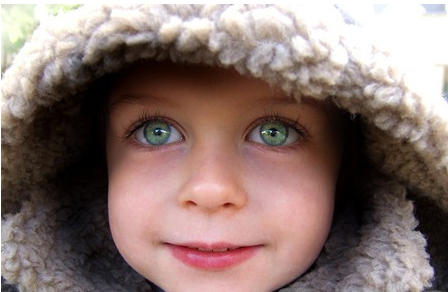
There is a reason why eyes are often called "windows of the soul". While we can choose our words and control certain facial expressions, our eyes never lie. They portray our thoughts, reflect the lightest shades of emotions, express interest, boredom, surprise, approval, or disbelief. Without words ever being spoken, our eyes have the power to attract, to judge, to frighten and to caress. You have probably witnessed yourself how often a parent can hush playful children just by giving them ‘the look’. Or how a young couple can flirt with each other across the table without ever saying a single word.
人们通常将眼睛称为"心灵的窗户",这不是没有道理的。尽管我们可以选择话语、控制某些面部表情,但是我们的眼睛绝不会说谎。它们透露了我们的想 法,反映了我们情绪中最细微的差别,表达了我们的兴趣、厌倦、惊奇、同意或是不信任。即便不说一句话,我们的眼睛也具有吸引、判断、恐吓和爱抚的能力。你 大概亲眼目睹过家长经常只是通过一个"眼神"就让顽皮的孩子安静下来,或者一对年轻的恋人隔桌相望,不说只字片语却互送秋波。
The language of our eyes is one of the most powerful and effective tools of non-verbal communication. And many times our success at a job interview, during business negotiations or on a first date depends on our ability to convey the right messages with our eyes. This is why it is so important to learn how to read the body language of the eyes and interpret it correctly. Here are the 10 Most Important Eye Expressions that we witness every day:
眼睛所透露的语言是最强有力、有效的非语言交流工具之一。许多时候,我们在求职面试、商业洽谈或者初次约会中的成功,取决于我们用眼睛传达正确信息的能力。这就是为什么学会如何解读眼神、正确理解它是如此重要了。以下是我们每天都亲眼所见的10种最重要的眼神:
1.Smiling eyes.
1.微笑的眼神。
Psychologists have long noticed that a sincere smile starts with our eyes. When we are genuinely happy the skin around the corners of our eyes crinkles, while a ‘socially polite’ inauthentic smile touches only our lips. Have you ever been in a situation when a shop assistant smiled at you, offering help and you immediately got the feeling that they were just trying to sell you something? Well, now you know why. The smile you had been given was not in the eyes.
心理学家经过长期的观察发现,一个真诚的微笑是从眼睛开始的。当我们由衷地高兴时,我们眼角的皮肤会皱起来,但是"在社交场合上礼貌的"微笑则是假笑,只涉及唇部的活动。你是否曾遇到过这样的情景:当一位店员微笑着向你提供服务时,你立刻感觉到他/她只不过是试图向你卖东西?好了,现在你知道原因了。你所感受的微笑并不是从眼睛里发出的。
2.Shy eyes.
2.羞涩的眼神。
People who avoid eye contact during a conversation are often perceived as insincere, deceptive and untrustworthy. Practice shows that this is not always the case.
在交谈中躲避目光接触的人常被视为不真诚、虚伪、不值得信赖。实践表明情况并非总是如此。
As strange as it may seem, a clear sign that someone is being being dishonest is greater eye contact, not a lack thereof (as a liar knows we are looking for signs of deception and purposely prolongs eye contact). What does little or no eye contact mean then? Anything from shyness, to nervousness, to boredom.
有一点似乎挺奇怪,有明显的迹象表明不诚实的人目光接触更多,而不是缺乏目光接触(就像一个说谎的人知道我们正找寻他欺骗的迹象,从而故意延长目光接触的时间)。那么没多少目光接触或者根本就没有意味着什么呢?害羞、紧张、无聊,这些都有可能。
3.Friendly eyes.
友好的眼神。
Looking a person straight in the eyes while carrying on a conversation sends a few clear messages to your interlocutor: you are comfortable in their company; you are relaxed and confident; you are paying attention to the conversation. This is why so many public speaking experts and motivational coaches advice maintaining eye contact with your interlocutors to make a positive first impression.
在交谈时直视对方会对你的谈话者传递几个明显的信息:你和他/她在一起很舒服;你很放松且有自信;你在交谈时集中精力。这就是为什么那么多的演说家和激励学生的教练会建议你对交谈者保持目光接触从而留下积极的第一印象。
4.‘Shut’ eyes.
4."闭"眼。
Covering the eyes, shielding the eyes, lowering the eyelids for a long period of time is a hard-wired unconscious attempt to block out something that we do not want to hear. For example, a man who is asked to work on the weekend may cover his eyes with his fingers rubbing them as he answers, "No problem". What his gestures are portraying, though, is how he really feels about the prospective of spending his weekend at the office – he is not happy about it at all.
长时间闭眼、遮眼和耷拉眼皮是在潜意识地试图阻挡我们不想听到的事情。例如,一个被要求在周末上班的人可能会闭上眼睛,边揉眼睛边回答"没问题"。但是他的姿态所表现的就是,他一想到要在办公室度过周末的真实感受——他对此一点儿也不开心。
5.Blinking eyes.
5.眨眼。
Psychologists and body language experts have noticed that when we are nervous or troubled about something our blink rate goes up. Often such behavior is seen with liars. Although, it takes more than increased blinking rate to accuse someone of lying as the same reaction is often seen with people under stress.
心理学家和肢体语言专家已经注意到,当我们紧张或是被某事所困扰的时候,我们眨眼的频率会上升。通常这种行为常见于说谎的人。然而,不要只因为眨眼频率增加而指责某人说谎,因为有压力的人也常常会有同样的反应。













